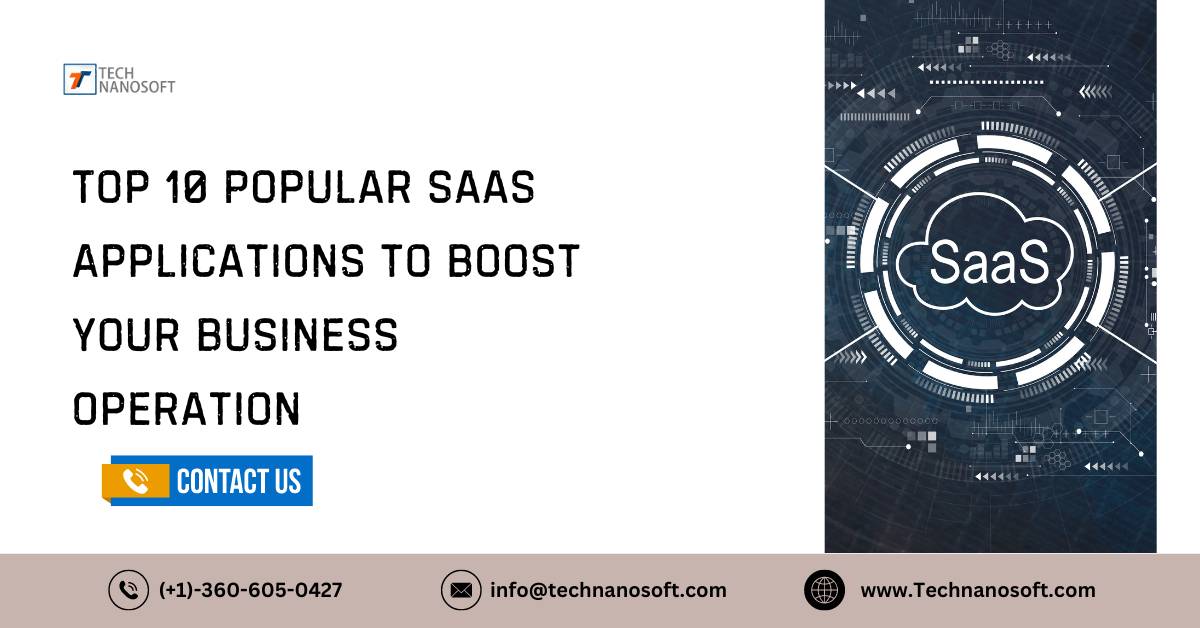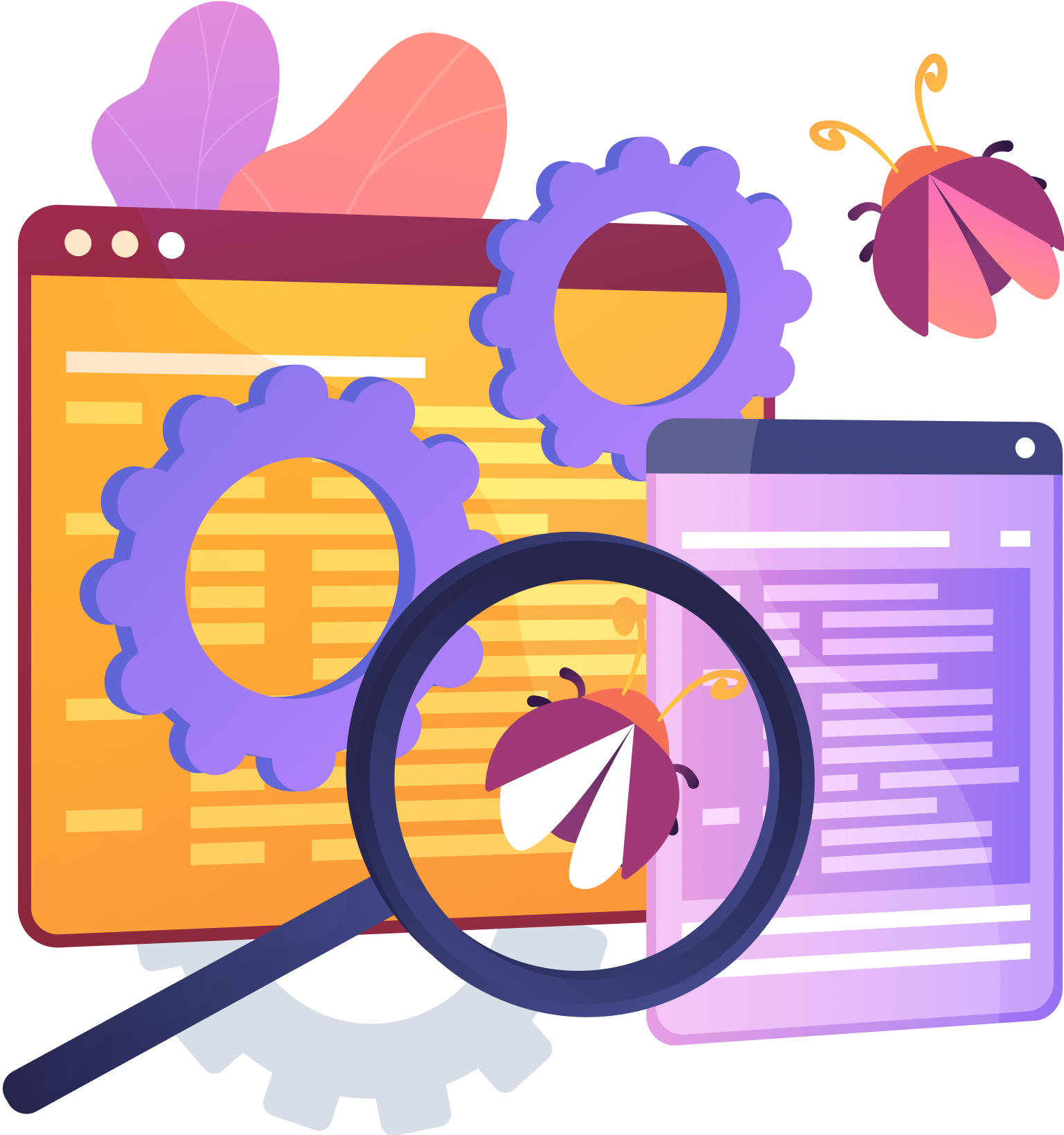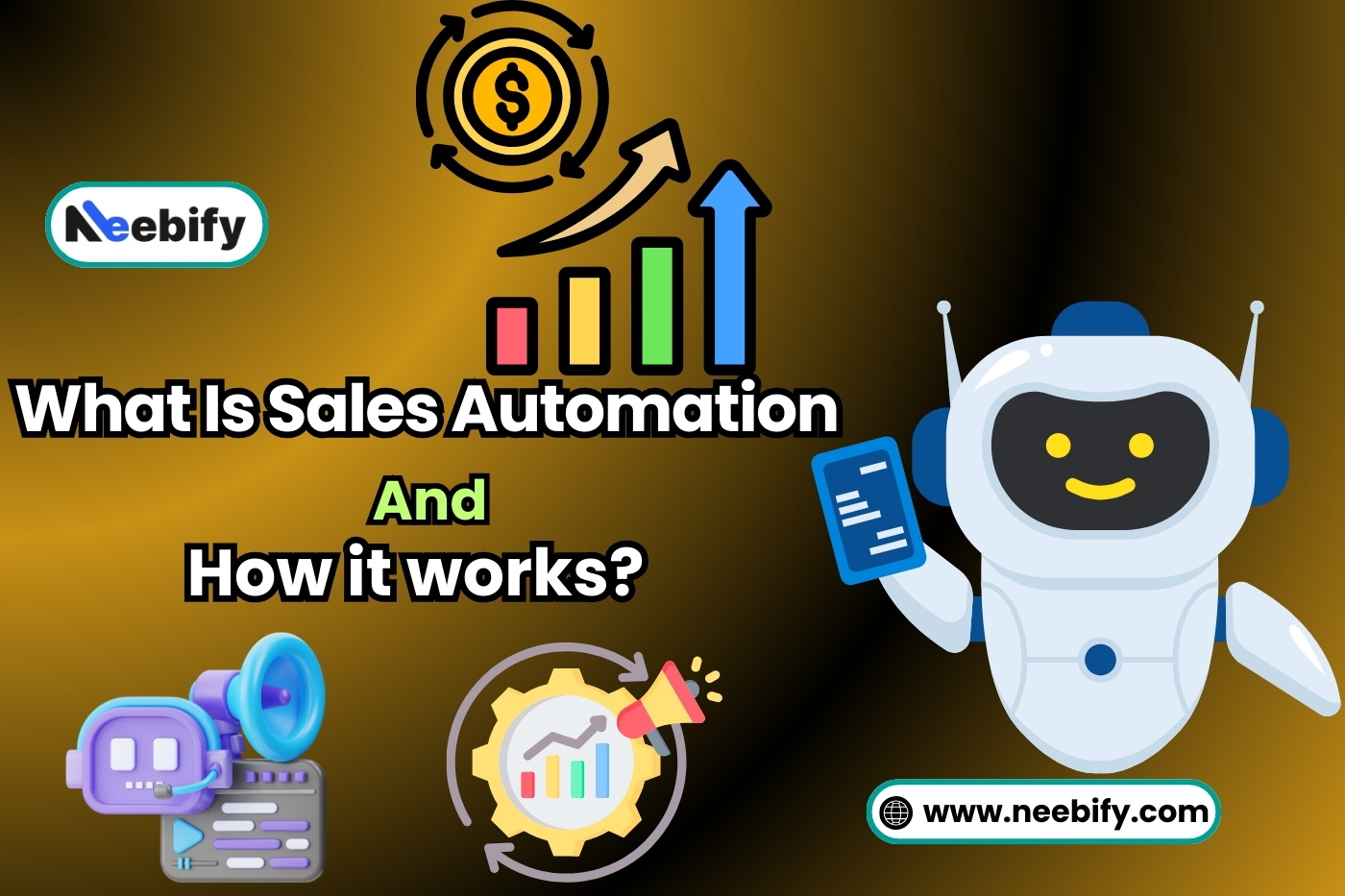Top 10 Popular SaaS Applications to Boost Your Business Operation

Nowadays, we are living in a digital era; even we cannot imagine our life without the internet. Today, small organizations or big businesses use software applications to grow their businesses, SaaS applications are one of these. Software as a Service (SaaS) applications have completely changed how firms conduct their operations in today's digital environment.
These cloud-based systems have many advantages, including affordability, scalability, and accessibility. Businesses must carefully select accurate SaaS tools from the plethora of possibilities available if they want to enhance their operations.
What Is SaaS Applications?
Software as a Service is referred to as SaaS. Applications are hosted by a provider and made accessible to users online in this style of software distribution. Users can access and utilize software through a web browser rather than installing it on individual PCs or servers.
In the SaaS model, the software provider manages the SaaS application security, infrastructure, and maintenance of the application, while users pay a subscription fee to access and use the software. This eliminates the need for businesses to invest in hardware, software licenses, and ongoing maintenance, making it a cost-effective solution for many organizations.
SaaS Applications Benefits as Compared To Traditional Software Models
Accessibility
Because SaaS apps can be accessed from any device with an internet connection, they redefine accessibility. This adaptability makes it possible for team members to collaborate effectively from a distance and for remote work to be done from any place. Users may easily connect to SaaS apps whether they are at work, home, or on the go, which improves productivity and efficiency in the fast-paced workplace of today.
Scalability
Scalability is a major benefit of SaaS applications, as it enables companies to modify resources in response to fluctuating demand readily. SaaS apps give you the flexibility to adapt to changing company needs, be it increased computer power or the ability to add or remove user licenses. This scalability guarantees that companies won't face constraints as they expand and can effectively manage resources, optimize expenses, and scale operations.
Cost-effective
SaaS saves businesses money by doing away with the up-front expenses of buying and maintaining hardware and software infrastructure. Typically paid monthly or annually, consumers pay a regular subscription fee in place of purchasing pricey hardware and licenses. In addition to lowering initial investment, this subscription-based pricing model offers predictable expenses, which facilitates efficient resource allocation and budgeting for enterprises. This encourages sustainability and financial efficiency.
Maintenance and Updates
SaaS providers make sure that consumers always have easy access to the most recent version of the product by relieving the load of security patches, software upgrades, and system maintenance. SaaS providers ensure smooth access to updated features and increased security measures without needing customers to manually install updates or maintain software infrastructure by centrally managing these operations. By taking a proactive approach to upgrades and maintenance, SaaS applications are kept secure and reliable while also improving user experience and minimizing disruptions.
Integration of SaaS Applications
With the powerful integration features that SaaS apps provide, organizations can easily share data across platforms and optimize operations. SaaS solutions enable cooperation and data interchange across several corporate areas, such as project management tools, accounting platforms, and customer relationship management (CRM) software integration. By removing data silos, improving operational efficiency, and letting companies take full advantage of their software ecosystem, this integration capacity eventually spurs innovation and productivity.
Collaboration
Strong collaboration features are found in many SaaS apps, allowing groups to collaborate on projects, share information, and communicate in real-time. SaaS apps promote cooperation and communication regardless of geographical location with capabilities like real-time messaging, collaborative task management, and shared document editing. In today's linked world, this cooperative atmosphere encourages openness, responsibility, and effectiveness in project management, enabling teams to accomplish their objectives more successfully and propel corporate success.
Businesses may concentrate on their core business activities while utilizing strong tools to increase productivity and efficiency thanks to SaaS applications, which provide a flexible, affordable, and user-friendly alternative for accessing and utilizing software applications.
The Top 10 Popular SaaS Applications
In recent years, SaaS (Software as a Service) applications have become popular and revolutionized how both organizations and people access and use the software.As we have previously discussed Software as a Service is the full form of SaaS. It refers to a software delivery model where a provider hosts and manages an application or software system centrally and makes it available to customers over the Internet.
In a SaaS application, customers typically access the software through a web browser or a thin client interface without the need to install or maintain the software on their computers or servers. After SaaS application development, customers often pay for the service on a monthly or annual basis to use the software.
Users may concentrate on using the programme rather than administering it because the provider is in charge of maintaining the infrastructure, managing updates and upgrades, assuring security, and handling other technical elements.
Salesforce
Top customer relationship management (CRM) software, Salesforce, assists companies in streamlining their sales, marketing, and customer care procedures. It offers a centralized solution for handling data analytics, sales pipelines, and customer contacts. Businesses may use Salesforce to strengthen client connections, increase sales effectiveness, and spur revenue development.
Slack
Slack is a collaboration and communication tool that enables teams to communicate and collaborate in real-time. It provides capabilities including file sharing, instant chat, and platform integration. Slack facilitates team collaboration, boosts productivity, and streamlines corporate communication.
Zendesk
It is customer care software that enables companies to offer quick and specialized help to their clients. It provides ticketing, a knowledge base, live chat, and analytics tools that let firms quickly address client concerns and raise general client happiness.
HubSpot
An all-in-one inbound marketing and sales platform is HubSpot. It provides tools for lead generation, social media management, email marketing, content production, and customer relationship management. HubSpot offers useful information for marketing and sales optimization while assisting organizations in attracting, engaging, and converting leads into customers.
Dropbox
It is a cloud-based file-sharing and storage platform. It enables businesses to store, access, and share files securely across devices and with team members. Dropbox boosts productivity and ensures data integrity by providing collaborative tools, version control, and data backup.
QuickBooks Online
For small and medium-sized firms, financial administration is made simpler by cloud-based accounting software and QuickBooks Online is a cloud-based accounting software. It offers resources for tax preparation, financial reporting, spending monitoring, and invoicing. Accounting procedures are streamlined, accuracy is increased, and better financial decision-making is made possible through QuickBooks Online.
Asana
Asana is a SaaS project management software that assists teams to manage, track, and organize their work. It provides features such as progress tracking, team collaboration, project timelines, and task management. It enhances task delegation, promotes transparency, and improves overall project efficiency.
Mailchimp
A platform for email marketing called Mailchimp enables companies to design, automate, and monitor email campaigns. It provides audience segmentation, A/B testing, and campaign analytics in addition to email templates. Businesses can better connect with their target market, build brand recognition, and encourage consumer interaction using Mailchimp.
Google Workspace
Gmail, Google Drive, Google Docs, and Google Sheets are all part of the productivity tool known as Google Workspace (formerly known as G Suite). It allows for seamless document sharing, real-time editing, and allowing team members to work together. Communication, productivity, and information management are all improved with Google Workspace.
Monday.com
Monday.com is a flexible work operating system that centralizes and accelerates team operations. The application provides project boards, task management, automation, and integration features. Monday.com assists firms in maintaining office environments, increasing task visibility, and fostering teamwork.
Conclusion
Choosing the perfect SaaS applications can amazingly boost business operations by improving productivity, streamlining processes, and boosting customer satisfaction. The most popular 10 SaaS applications mentioned above, including Salesforce, Slack, Zendesk, HubSpot, Dropbox, QuickBooks Online, Asana, Mailchimp, Google Workspace, and Monday.com, offer efficient systems to transform businesses and get success.
These applications are like powerful tools in the software industry. They offer suitable, affordable, and easily reachable solutions that cater to the evolving needs of people and businesses in today’s age.
FAQs about Saas
Q.1- What is SaaS (Software as a Service)?
A- Software as a Service, or SaaS, eliminates the requirement for local installation by delivering software programs via the Internet. Users pay membership fees to access these programs through web browsers or client interfaces. SaaS provides enterprises with cost-effectiveness, scalability, and flexibility across a range of services, including HRM and CRM.
Q.2- How Do You Use SaaS?
A- Cloud infrastructure is used to host SaaS applications by providers who also handle maintenance duties. Without requiring manual updates, users can access the most recent software versions remotely. This centralized method promotes flexibility and cooperation by making information accessible from any internet-connected device.
Q.3- What Advantages Come With Using SaaS?
A- Because SaaS eliminates the need for upfront software and hardware purchases, it is more affordable. It allows for scalability, maintenance-free operation, and accessibility from any location. This adaptability and efficiency are fostered by the ability of businesses to modify expenses and resources as needed.
Q.4- Is cloud-based software secure?
A- SaaS companies prioritize security, utilizing encryption techniques, access controls, and compliance measures to safeguard user information. Users are reassured about the dependability and integrity of SaaS applications by these strong security measures, which guarantee data confidentiality and regulatory compliance.
Q.5- Why Opt for SaaS?
A- SaaS has many benefits, such as affordability, scalability, and accessibility. Companies may scale resources according to demand, saving money upfront and doing away with the headache of software maintenance. Users can work remotely from any location, which encourages flexibility and teamwork.
Q.6- Are SaaS Applications Customizable?
A- Numerous SaaS systems can customize features to meet unique corporate requirements. Because of its adaptability, firms may better optimize their workflows and increase production and efficiency.
Q.7- How Can SaaS Providers Guarantee Data Security?
A- Select trustworthy SaaS providers with strong security features, such as encryption, access controls, and frequent audits, to guarantee data security. To further safeguard sensitive data, adhere to best practices, including data encryption and rigorous password management.
Q.8- Are Small Businesses Fit for SaaS?
A- Yes, because of its cost, scalability, and user-friendliness, SaaS is especially advantageous for small organizations. Pay-as-you-go pricing methods and no upfront charges allow small businesses to obtain cutting-edge software solutions without breaking the bank.
Q.9- Which Sectors Gain from SaaS?
A- SaaS is advantageous to many businesses, including manufacturing, healthcare, finance, and retail. SaaS apps provide customized solutions for a range of tasks, including inventory management, accounting, and customer service.
Q.10- How Do I Pick the Best SaaS Supplier?
A- Think about aspects like features, dependability, security, and customer service when selecting a SaaS provider. Assess suppliers according to their performance history, standing, and capacity to efficiently fulfill your company's needs.









